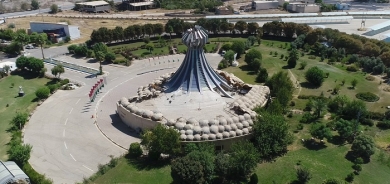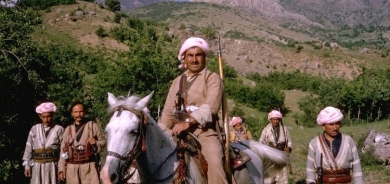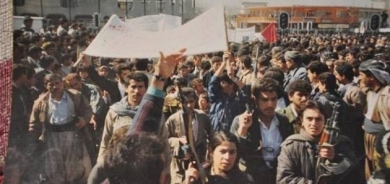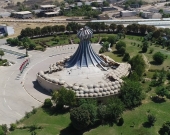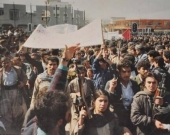How the Strait of Hormuz could factor into Iran’s retaliation
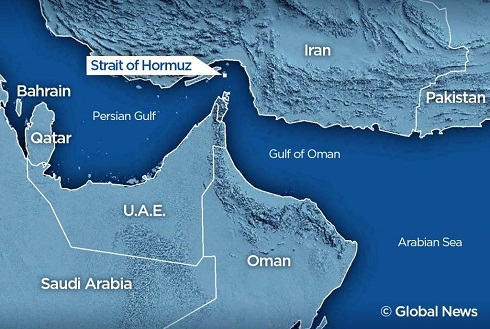
Iran said America committed a “grave mistake,” and has vowed “revenge” for Soleimani’s death, without indicating when that could happen or what that would look like.
The threat has many concerned a retaliatory act could take place in the world’s largest oil chokepoint, the Strait of Hormuz, limiting the globe’s oil supply and potentially sending gas prices skyrocketing further.
What is the Strait of Hormuz, why is it important and could Iran block it?
Here’s what experts have to say.
What is the Strait of Hormuz and why is it important?
The Strait of Hormuz lies between Oman and Iran. It links the Persian Gulf with the Gulf of Oman to the south and the Arabian Sea beyond.
What is the Strait of Hormuz, why is it important and could Iran block it?
Here’s what experts have to say.
What is the Strait of Hormuz and why is it important?
The Strait of Hormuz lies between Oman and Iran. It links the Persian Gulf with the Gulf of Oman to the south and the Arabian Sea beyond.
According to data from analytics firm Vortexa, almost a fifth of the world’s oil passes through the strait — some 17.4 million barrels per day (bpd) versus consumption of about 100 million bpd in 2018.
OPEC members Saudi Arabia, Iran, the UAE, Kuwait and Iraq export most of their crude via the strait. Qatar, the world’s biggest liquefied natural gas (LNG) exporter, sends almost all of its LNG through the strait.
During past moments of tension with the U.S., Iran threatened the supply of oil that travels from the Persian Gulf to the rest of the world.
Due to instability in the region, the United Arab Emirates and Saudi Arabia have sought to find other routes to bypass the strait, including building pipelines.
Last year, two tankers were attacked in the Gulf of Oman, causing a 14 per cent surge in oil prices.
The attack illustrated how big an impact disruptions to supplies can have on the market. The strike briefly took out about half of the supplies from the world’s largest oil exporter.
The U.S. blamed Iran for the attacks, however, the country has denied responsibility.
On Friday, oil prices surged once again, with the international benchmark for crude oil jumping 3.7 per cent, or $2.45 to $68.70 a barrel in London trading. The U.S. contract was up 3.6 per cent, or $2.18, to $63.36.
If sustained, the rise in oil prices could lead to more expensive car fuel, heating and electricity bills, stifling the global economy at a time when it is already slowing.
Could Iran block shipping in the Strait of Hormuz?
In an interview with Global News, Dennis Horak, Canada’s former Ambassador to Saudi Arabia said there is debate in military circles whether Iran has the capability to completely block shipping in the Strait of Hormuz in the wake of Soleimani’s killing.
Horak said, however, Iran “could probably” disrupt shipping in the strait, like what was seen over the summer.
Horak said these disruptions increase costs “all the way down the line,” and pointed to the the Iran and Iraq war, when disruptions in the strait impacted oil prices and shipping capabilities.
He said that in this case though, the world is likely to see a “much more rigorous American response” to keep the strait open.
Horak told Global News he is not sure Iran could block the strait for an extended period of time, saying the U.S. and other countries would likely “act very decisively” to reopen it.
“It would be a very dangerous step,” he said. “The Iranians have threatened this for some time, partly in response to sanctions, the idea that ‘if we can’t export oil nobody else can either,’ but it is a global strategic priority to keep the shipping lane open, and so I think you would see a much wider international response.”
Ali Fatholla-Nejad, a visiting fellow at the Brookings Doha Centre told Global News that it is a “highly unlikely scenario” that Iran would close the strait.
“An escalation or response or retaliation in the Persian Gulf region would heavily disrupt oil flows,” he said. “The Iranians would basically shoot themselves in the foot by jeopardizing the remaining rest of their oil income which they are highly dependent on.”
How else could Iran retaliate?
Fatholla-Nejad said the most likely scenarios are some kind of response in Iraq or Lebanon, but said there would be costs associated with both.
He says the “easiest” retaliation Iran could engage in would be an escalation in nuclear conflict.
“In any case they’re poised to take the next step in the gradual reduction of their commitments under the JCPOA [Joint Comprehensive Plan of Action — also known as the Iran Nuclear Deal], I think by Monday,” he told Global News. “So this kind of escalation would be, compared to all the other ones, the least costly.”
Horak says another “very possible,” and maybe even “likely” response from Iran would be cyberattacks.
“The Revolutionary Guard have what’s called a cyber army and they’ve been very active in the past,” he said. “So it may be in the arsenal, may be one of the tools they pull out of the tool box, but I’m not sure that would be sufficient to address the demands.”
But, according to Horak, it could be days or even a week until Iran decides how it is going to respond.
“Maybe the emotions die down a bit, in which case some of these more asymmetrical attacks will perhaps address the need,” he said.
Global News’ Maryam Shah, The Associated Press and Reuters


